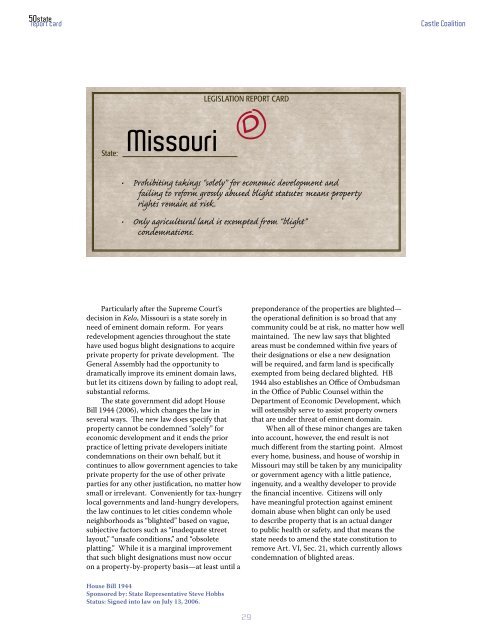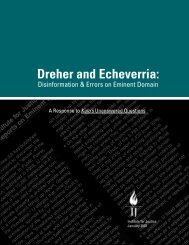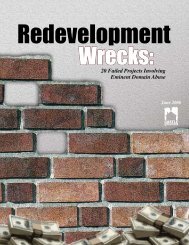50 State Report Card - The Castle Coalition
50 State Report Card - The Castle Coalition
50 State Report Card - The Castle Coalition
- No tags were found...
You also want an ePaper? Increase the reach of your titles
YUMPU automatically turns print PDFs into web optimized ePapers that Google loves.
<strong>50</strong>statereport card<strong>Castle</strong> <strong>Coalition</strong>LEGISLATION REPORT CARD<strong>State</strong>:Missouri• Prohibiting takings “solely” for onomic development andfailing to reform groly abused blight statut means propertyrights remain at risk.• Only agricultural land is exempted from “blight”condemnations.Inc.Particularly after the Supreme Court’sdecision in Kelo, Missouri is a state sorely inneed of eminent domain reform. For yearsredevelopment agencies throughout the statehave used bogus blight designations to acquireprivate property for private development. <strong>The</strong>General Assembly had the opportunity todramatically improve its eminent domain laws,but let its citizens down by failing to adopt real,substantial reforms.<strong>The</strong> state government did adopt HouseBill 1944 (2006), which changes the law inseveral ways. <strong>The</strong> new law does specify thatproperty cannot be condemned “solely” foreconomic development and it ends the priorpractice of letting private developers initiatecondemnations on their own behalf, but itcontinues to allow government agencies to takeprivate property for the use of other privateparties for any other justification, no matter howsmall or irrelevant. Conveniently for tax-hungrylocal governments and land-hungry developers,the law continues to let cities condemn wholeneighborhoods as “blighted” based on vague,subjective factors such as “inadequate streetlayout,” “unsafe conditions,” and “obsoleteplatting.” While it is a marginal improvementthat such blight designations must now occuron a property-by-property basis—at least until apreponderance of the properties are blighted—the operational definition is so broad that anycommunity could be at risk, no matter how wellmaintained. <strong>The</strong> new law says that blightedareas must be condemned within five years oftheir designations or else a new designationwill be required, and farm land is specificallyexempted from being declared blighted. HB1944 also establishes an Office of Ombudsmanin the Office of Public Counsel within theDepartment of Economic Development, whichwill ostensibly serve to assist property ownersthat are under threat of eminent domain.When all of these minor changes are takeninto account, however, the end result is notmuch different from the starting point. Almostevery home, business, and house of worship inMissouri may still be taken by any municipalityor government agency with a little patience,ingenuity, and a wealthy developer to providethe financial incentive. Citizens will onlyhave meaningful protection against eminentdomain abuse when blight can only be usedto describe property that is an actual dangerto public health or safety, and that means thestate needs to amend the state constitution toremove Art. VI, Sec. 21, which currently allowscondemnation of blighted areas.House Bill 1944Sponsored by: <strong>State</strong> Representative Steve HobbsStatus: Signed into law on July 13, 2006.29





